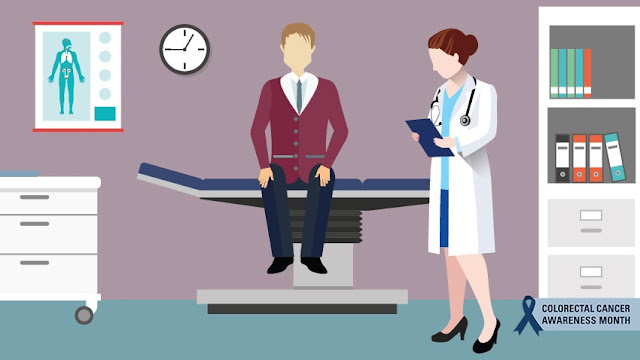Colon cancer is the third maximum generally identified most cancers in the united states. the good information? It’s additionally the maximum preventable, and normal prognosis rates of colon cancer were at the decline in view that 1990.
The horrific news is that the occurrence of colon cancer amongst humans 50 and younger has been growing by means of approximately 1.5 percent annually all through the equal time period. also regarding is that these more youthful patients have been more likely to be diagnosed at advanced tiers.
Elena Stoffel, M.D., assistant professor of internal medicine on the college of Michigan clinical college and director of the most cancers Genetics health center at the U-M complete most cancers middle, has spent her career working in colon cancer prevention and research.
She spoke lately approximately who is probably most at risk at a more youthful age and how doctors can prevent or trap colon most cancers in advance.
ordinary colon most cancers screening isn’t typically recommended before age 50. How are you locating these younger sufferers?
Stoffel: most of them are being identified once they present with signs like rectal bleeding, abdominal ache, weight reduction and anemia. We commonly don’t think about colon cancer in younger people because we’re so used to seeing it in older humans.
I educate my GI fellows that once we see a young person in the clinic who's complaining of rectal bleeding, we can’t just push aside it as hemorrhoids. you have to reflect onconsideration on what else this can be. They want to constantly reflect onconsideration on the opportunity that this may be a colon cancer in a younger person. We recognize we’re seeing it more often; we’re just not considering it.
I suppose that’s why a number of the diagnoses in younger people are made at later levels — we don’t inspect those signs and symptoms as quick as we'd in an older individual. you could’t just count on that younger people don’t get colorectal cancer.
How do you become aware of which populations have a greater threat of colon cancer?
Stoffel: We realize that circle of relatives history of colon most cancers has a primary impact on your colon most cancers threat. We commonly say that the common man or woman’s lifetime chance for developing colon cancer is set five percent. if you have one first-degree relative with colon cancer, your hazard is roughly double that. but if you have more than one relatives with colon most cancers, and mainly if those cancers had been identified at younger a long time, then your risk is an awful lot higher.
There are certain genetic elements that increase your threat for colon cancer. The maximum common hereditary colon cancer syndrome is a circumstance known as Lynch syndrome, and we recognise that approximately 3 percentage of all colon cancers are attributable to Lynch syndrome.
but whilst you have a look at younger human beings with colon most cancers, we simply have determined that this institution is more likely to have a genetic link. kind of 1 in each five humans underneath the age of 50 with colon most cancers has a genetic predisposition to it.
Does this cancer derived from Lynch syndrome behave in a different way?
Stoffel: sure. Your common colon cancer takes 10 to fifteen years to expand, so if the common individual gets colonoscopies each five to ten years, starting at the age of 50, we will take away polyps earlier than they are able to develop into cancers.
but a few cancers with a unique molecular subtype can grow right away, developing from polyps in below three years, and Lynch syndrome cancers can try this. because of this, we endorse colonoscopies annually for people with this genetic circumstance.
how many of the populace has Lynch syndrome?
Stoffel: latest statistics endorse those Lynch syndrome mutations are more not unusual inside the trendy population than we thought they had been, such that 1 out of each 300 people has Lynch syndrome and doesn’t understand it. now not anyone with this type of mutations gets most cancers, however those mutations boom your risk of developing most cancers through orders of importance.
should doctors start checking out for colon cancer in more youthful patients, no matter their hazard?
Stoffel: I suppose it is vital to emphasize that colon cancer is one of the maximum preventable cancers. The sizeable majority of colon cancers get up from polyps, and if we discover these polyps and get rid of them early, we can save you them from developing into cancers. In trendy, colon polyps are much less not unusual in younger people.
modern-day hints suggest that individuals at average risk for colon cancer begin screening at age 50. There are numerous extraordinary varieties of colon most cancers screening tests.
Colonoscopies are the gold popular take a look at but are invasive and carry some hazard for complications. For those who are at common chance for colon cancer, there are different approaches to display for colon most cancers which might be less invasive than colonoscopy. Stool DNA and fecal occult blood checking out paintings nicely for finding cancers — however aren't as top at stopping cancers.
right here at U-M, we’re running to increase tests that discover polyps which can be less invasive than colonoscopies, which would permit us to get extra people screened for colorectal cancer.
The question, even though, is whether or not we need to start screening at a while under 50. I think the important message is that people need to have a verbal exchange with their medical doctor approximately their own family history of most cancers to look at their risk for colorectal cancer and decide the great age to start screening.



No comments:
Post a Comment